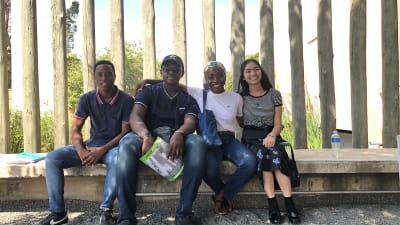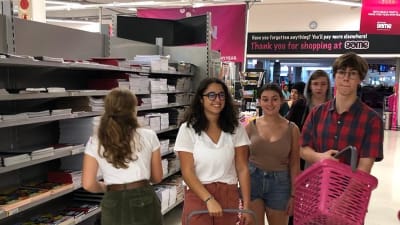SEGL at ALA Week 1
After a packed weekend of orientation, the SEGL at ALA students jumped into their classes with an impressive amount of energy–particularly considering the jet lag they were still fighting!
In Ethics and Leadership class we started with another SEGL tradition: the Infamous Skittles Scenario, a hands-on, state-of-nature simulation in which students hunt for small plastic bags of candy they need in order to survive. As they search, they receive randomly assigned “chance cards” that complicate their situation and force them to consider what they would prioritize in uniquely difficult circumstances. Each cohort takes a different approach, and it was fascinating to observe how this group attempted to prioritize the survival of the maximum number of people.
In our DC program, we follow this activity with an introduction to classic Western ethical theory–Aristotle, Kant, and John Stuart Mill. We met those philosophers this week, too, but considering our South African context, we led with a discussion of sub-Saharan Ubuntu philosophy as defined by a group of researchers at the University of Johannesburg and the University of Botswana:
A good starting point for understanding sub-Saharan morality, or the major strand of it that we explore, is the phrase, ‘A person is a person through other persons’ or ‘I am because we are.’ In southern African languages, this would be, ‘Motho ke motho kabatho babang’ in Sotho-Tswana and ‘Umuntu ngumuntu ngabantu’ in the Nguni languages of Zulu, Xhosa or Ndebele. Most people in Botswana, South Africa and Zimbabwe speak either one of these languages or a language related to them. However, the phrase is not restricted to these languages, and many sub-Saharan societies have versions of it in their respective languages. The Kenyan John Mbiti (1969), in his classic survey of African world views, takes the phrase to be a ‘cardinal point in the African view of man’ (pp. 108–109) and a large majority of scholars agree with him on this score.
As Augustine Shutte (2001), one of the first professional philosophers to seriously engage with Ubuntu/Botho, says, ‘Our deepest moral obligation is to become more fully human. And this means entering more and more deeply into community with others…If one harms others, e.g. by being exploitive, deceptive or unfaithful, or even if one is merely indifferent to others and fails to share oneself with them, then one is said to be lacking ‘Botho’ (Sotho-Tswana) or ‘Ubuntu’ (Nguni), literally lacking in personhood or humanness.
How poignant, then, to realize that our students had approached the Skittles scenario with a philosophy of Ubuntu before they’d even learned a word to describe it!
On Thursday afternoon, during our long block for Ethics and Leadership, our students had the opportunity to consider all of these different philosophies as they interacted with our first guest speaker of the semester: Hatim El-Tayeb, the current Dean of ALA. (Dean is the equivalent of Head of School in the U.S.) Dean Hatim, who studied philosophy and teaches the African Philosophy course at ALA, began by engaging students with two different readings: one by Yvonne Mokgoro, a former Justice on the Constitutional Court of South Africa, and another by Kwame Gyekye, a Ghanaian philosopher and a central figure in the development of modern African philosophy. He then walked them through a leadership scenario of his own involving the most difficult student disciplinary case he has faced during his tenure at ALA. Our students wrestled with the philosophical frameworks they’d learned earlier in the week, trying to decide what they would have done in Dean Hatim’s shoes. Speak to a current student to find out whether or not they agreed with his decision!
We wrapped up our week in Ethics and Leadership with an introduction to SEGL’s own critical thinking framework: SEE – THINK – ACT – REFLECT, or STAR. This four-step process helps students evaluate information and choices in our “fake news,” “snap judgment” era. In DC, our opening critical thinking session revolves around a controversial statue of President Lincoln in a local park. Here in South Africa, we opted to discuss a similarly disputed statue of Cecil John Rhodes at the University of Cape Town. The #RhodesMustFall movement, which began in March 2015, raises many of the same questions that American schools, cities, and communities are facing about historically significant monuments to figures whose legacies are controversial in 2020. Our students debated possible outcomes for the statue: Should it stay? Be destroyed? Move to another location? Add an explanatory plaque? As with any SEGL session, there were students who landed on each of these possible conclusions, and the discussion was robust and animated.
And they took the STAR model to the Apartheid Museum this weekend, where they were able to understand more fully the context of their new home. After a guided tour through the museum, we tasked each student with choosing an object or artifact in the museum and applying the STAR model to it: First, see it: and write down as many observations as you can about it. Next, think it: begin to judge, conclude, guess, and evaluate; read the information the museum has provided to give context and meaning to the object. Then, act it: consider how you might have chosen to display the object if you were the director of the museum. And, finally, reflect: why it is that you would have made that decision, whether/why some of your peers would have made a different one, what factors might have swayed you in the direction you chose, and how might that decision impact the people around you?
Of course, there is also plenty of time for non-academic fun and bonding with each other and the broader ALA community. On Saturday morning, our students joined the ALA “Houses” they’d been assigned upon arrival and participated in a series of competitive, semi-athletic activities for Founders’ Day, a celebration of ALA’s inception in 2008. Colleague after colleague approached us to observe, with wonder, how quickly and seamlessly this cohort has become part of the ALA community. That afternoon, they attended a student-organized “Pan-African Souk,” a sort of informal market where ALA students sold items from their home countries across the continent. And on Saturday evening, many of them attended a game night hosted by their peer counselors. They’ve been playing a lot of Uno in the evenings leading up to check-in; there is a large group of SEGL and ALA students who are in fierce competition with each other on a nightly basis. It’s been so much fun to watch them integrate both intellectually and socially on campus!
At the end of the week, we had a dinner to debrief their adjustment, and each student shared a “rose,” a “thorn,” and a “bud”: something to celebrate, something that was hard, and something they were excited to watch grow in the weeks and months to come. Their thorns were small in the grand scheme of the major adaptation they are going through: new sleep schedules, difficult science courses, vegetarians learning how to get enough protein (we’re helping!). But the buds and the roses were astounding: multiple students noted that they can feel their thinking processes changing already, that their vocabularies are shifting, that they are finding and making connections they didn’t expect, that big life conversations continue from classes onto the basketball courts and into the dorms late at night. We cannot wait to see how these buds continue to blossom in the weeks and months ahead.



























